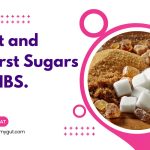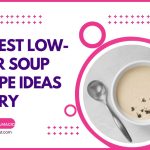Eating Apples With IBS: Dried, Green, Peeled, Cooked Apples, & more.
Quick Insights: What you need to know.
- Apples are high-FODMAP fruits containing both fructose and sorbitol.
- In 3 out of 4 IBS sufferers, Apples may trigger your IBS symptoms.
- The only way to decide if apples are good or bad for your IBS is to have 6-8 weeks of a low FODMAP diet and then re-introduce apples to see their effects on your IBS.
- A medium (160 grams) or small (30 grams) apple serving may trigger your IBS.
- Regarding their FODMAP content, there are no significant differences between red (Pink Lady) and green (Granny Smith) apples.
- Peeling, Cooking, Juicing, or drying apples doesn’t seem to alter its effects on IBS.
Are apples good or bad for IBS?
Apples are high in both sorbitol and fructose. Fructose and sorbitol are FODMAPs (rapidly-fermented short-chain carbohydrates) that can trigger your IBS symptoms (ref). So, apples are generally BAD for IBS.
However, some IBS patients can tolerate consuming small amounts of apples. So, the key is to experiment with different amounts and types of apples. Experimenting and keeping a food diary of symptoms will help you determine whether it is good or bad for your IBS.
Today we will discuss the effect of apples on your IBS, which is dependent on many factors, such as:
- The cause and the type of your IBS.
- The amount you eat from apples.
- Processing of apples: peeling, drying, … etc.
Apples and IBS-C (constipation).
Sorbitol is known to have a laxative effect and can trigger diarrhea. Apples are high in sorbitol. So, they can, theoretically, fight constipation-predominant IBS.
Apples (with prunes and pears) are recommended for constipation in children and adults, but the story is different with IBS constipation.
Apples are high in both sorbitol and fructose (two FODMAPs). Those two sugars rapidly ferment and produce gas, worsening your IBS symptoms such as abdominal pain, distension, and bloating. So, they can do more harm than improvement in your IBS constipation (ref).
Related: SUGAR AND IBS, ten interesting facts.
However, IBS-C patients are not equal. Therefore, two IBS-constipation patients may respond differently to medications and food (including apples).
Also, a low FODMAP diet is not a lifetime diet; it should be trailed under the guidance of a dietitian for 2-6 weeks. According to Monash University research, About 75% of IBS patients respond to a low FODMAP diet (including apples).
Another interesting fact about IBS low FODMAP diet is that different patients have different degrees of sensitivity to different types of FODMAP (Fodmaps are of 6 main types: fructose, lactose, Mannitol, sorbitol, GOS “Galacto-Oligo-Saccharides,” and fructans ).
So, Apples may not be pure evil to your IBS, Some people with IBS-C may tolerate apples based on the following:
- Not all people respond to a low FODMAP diet.
- People are not usually sensitive to all six types of FODMAPs.
- A low FODMAP diet is not a lifetime practice.
- Apples may have a beneficial effect on your IBS constipation (they have a laxative effect).
In conclusion, apples can trigger IBS symptoms such as abdominal pain and bloat in many people with IBS constipation. However, Experimenting with apples is the key to determining whether apples are good or bad for your IBS.
Keeping a food diary and recording symptoms related to apples with IBS will help you to decide the effect of apples on your IBS constipation.
(Later in this article, we will explain how to test Apple’s effects on your IBS).
Apples and IBS-D (diarrhea).
It makes more sense to avoid apples with IBS-D (IBS-Predominant diarrhea) Because sorbitol in apples is a laxative and can worsen diarrhea.
People with IBS-D are more likely to benefit from restricting FODMAP. This is because FODMAPs (like sorbitol and fructose in apples) draw more water into your digestive tract.
More water equals diarrhea, bloating, and abdominal pain. Therefore, restricting apples may be a good option if you have a diarrhea-predominant IBS.
But always remember that not all people benefit from restricting FODMAPs. About 3 out of every four people will respond to low FODMAP foods (including apples).
Shall you stop eating apples with IBS?
The answer to these questions can be confusing to some of you.
And no one answer fits every IBS patient. And before we answer this, you have to remember some important facts:
- A low FODMAP (including apples) diet is not a lifelong diet plan.
- About 25% of people with IBS DON’T benefit from restricting their FODMAP.
- To know the effect of apples on your IBS, You have to Follow the right FODMAP plan, better with guidance from your dietitian or doctor.
To evaluate the effects of apples on your IBS, start a 3-phase Low FODMAP plan as follows (which will help you to decide if you will stop eating apples for IBS or not):
Phase 1: Restriction.
You have to start a low FODMAP diet plan in which you will restrict all types of FODMAPs for at least 6-8 weeks.
As an IBS patient, you will have a 75% chance to benefit from this 6 8- week restrictive diet. So, by the end of this 8-week phase, you will either:
- Experience an IBS-symptom improvement (in 75% of cases): then you will complete the diet plan and move to the second phase (reintroduction).
- Experience No improvement in your IBS symptoms after eight weeks (in 25% of cases): you won’t probably need a low FODMAP diet (and you can eat apples now as restricting them didn’t provide relief).
Phase 2: Reintorduction.
You should re-introduce FODMAP foods in this phase (with your dietitian or doctor).
People with IBS are not sensitive to ALL the six types of FODMAPs. The strategy of re-introduction is to bring back one food type at a time (let’s say apples are the first food to re-introduce).
You can decide whether apples are IBS triggers by keeping a food and symptom diary.
Phase 3: Personalization.
In this phase, you will continue to test different types and amounts of FODMAPs. This will help you to design a list or a plan for the exact food types and amounts that may hurt your IBS.
After implementing a low FODMAP diet challenge correctly, you can decide what foods to restrict and what to keep eating. This can be used to evaluate any food effects on your IBS symptoms.
Red apples (pink lady) and IBS.
As a general rule, apples are high in FODMAPs. But is there a difference between different types of apples?
- A common type of apple is the red apple (pink lady); one serve of a medium red apple (about 160 gm) is high in both sorbitol and Fructose (both are FODMAPs).
- A small 30 gm serving (about two tablespoons) of a red apple contains moderate sorbitol. It can be eaten cautiously; restrict if you are intolerant to sorbitol.
- A low/green serve of red apples (about 25 gm) is low in FODMAPs. You will mostly tolerate such an amount of red apple.
Source: Monash FODMAP app. (a highly recommended lifesaver app for IBS sufferers).
Green apples (granny smith) and IBS.
Green apples usually have the same effects as red apples. They contain almost identical amounts of FODMAPs. A medium (160 gm) or small serving (30 gm) of green apples can trigger your IBS. Refer to red apples for details.
Source: Monash University FODMAP app available on Apple App Store and Google Play.
Dried apples and IBS.
Dried apples appear to contain the same amounts of FODMAP sugars (sorbitol and fructose) which can trigger your IBS. According to the Monash University FODMAP app, even a small quantity of dried apples ( 8 rings or 30 grams) are high in fodmap. So, apple drying doesn’t make it more tolerable with IBS.
Source: Monash University FODMAP app available on Apple App Store and Google Play.
Peeled apples and IBS.
The FODMAP content of the apple is located in its flesh, not in the skin. So, peeling apples doesn’t decrease their FODMAP content.
Peeled apples will provide a more FODMAP content per serving, resulting in more worsening rather than improvement in your IBS symptoms.
Cooked apples and IBS.
We couldn’t find specific research on the effect of cooked apples on IBS. However, It is unlikely for cooking to change the FODMAP content of High FODMAP foods from high to low (ref), (ref).
Cooking will only result in the non-significant alternation of Apple’s FODMAP content. So, cooked apples are unlikely to make them more tolerable to your IBS.
Apple juice and IBS.
Juicing any High FODMAP fruit (including Apples) doesn’t affect your IBS. If your IBS is triggered By apples, juicing, mashing, peeling, or cooking doesn’t result in significant changes regarding its effect on IBS.












